
“Sorry, I’m eating a salad.”
We meet Michael Henry in the garden of a popular Hollywood coffee shop where, yes, he munches a modest salad. Dressed in his trademark ball cap, t-shirt, and shorts, he looks like he just walked out of one of his YouTube comedy videos. That feels appropriate: we’ve finally met up with Henry to discuss his latest comedy endeavor, the digital sitcom Hot Homo Summer. New episodes drop every week on YouTube.
Hot Homo Summer finds Henry and his frequent collaborators in full social mode following the year-and-a-half lockdown of COVID-19. Rested, restless and starved for man company Michael (played by Henry, of course) and his friends resolve to have a summer rife with parties, pools and a lot of gay sex. Of course, just because the pandemic has gone on the wane doesn’t mean everything has changed, as Michael soon learns.
Hot Homo Summer finds Henry returning to a serialized format, his first series since The Journey of Being Likable back in 2017. Since that time, he’s continued to release his popular sketch comedy videos, offering commentary on life in the queer world. He’s also picked up a gaggle of Queerty Award nominations for his work.
How about we take this to the next level?
Our newsletter is like a refreshing cocktail (or mocktail) of LGBTQ+ entertainment and pop culture, served up with a side of eye-candy.
We met up with Henry to discuss the new series, his career trajectory and his real views on gay life. New episodes of Hot Homo Summer stream every week on YouTube.
So you’re someone that specializes in sketch comedy. What made you want to go one step further and do a series?
I wanted to stretch myself and tell a full, narrative story.
That’s great, to push yourself as a writer.
It’s because a lot of people who make money from social media are just going to follow what’s making them money, what’s getting traction. I’m doing this for artistic purposes. I’m really artistically fulfilled doing sketches, but I also want to diversify.

Awesome. When the trailer dropped I saw some commenter referred to it as the Michael Henry extended universe. The new MCU. Was the intention always to bring back some of the “characters” from your various other sketch videos?
You know, during the pandemic I just had a lot of ideas. I had a lot of downtimes too, like a lot of people did. So I kept tacking ideas to my wall that could be plot points or characters. I wasn’t really thinking that down the line I would put it all together and make a web series, I just was like let’s do this. So I organized it all together over a couple weeks.
So true indie filmmaking—get out there, get it done.
100%. This time around I did it less guerrilla-style. I actually got permission for locations. But this time I really just had ideas. In the beginning of May, I wrote most of the series and organized shooting it. And that was it. I really was like let’s do it. I feel like when you sit and stew on something, it doesn’t really happen. You just have to do it.
Your style of comedy borrows heavily from Looney Tunes, but it also has a bit of Jonathan Swift-type social commentary. There’s always an undercurrent of thought. Also, you walking outside Linoleum City in a disco suit made me legit cackle.
[Laughter]
All of which is to ask: who are your inspirations? Who do you want to emulate?
My overall inspirations are The Golden Girls, John Waters and the Naked Gun and Airplane series.
David Zucker. Gotcha.
Yes. All of the elements: John Waters has this indie, queer perspective. Airplane for really bizarre, funny editing. And also, Paul loves sound effects. And then I leaned into it—people loved it. It’s in the comments: people love the sound effects and weird editing stuff. And I love Golden Girls just because of their actual relationships with one another.

I would also point out that both The Golden Girls and John Waters—who doesn’t get enough credit—have a lot of social commentary to them.
Yeah.
So much of your work revolves around what a friend of mine calls “homoshame.” That is, elements of the queer community or queer life that are embarrassing or stereotypical to the community, but that we kind of own. How much does your personal experience fuel your comedy?
100%. I mean, come at everything from an outsider’s point of view.
Why is that?
I come from an outsider’s point of view because I never felt celebrated in the gay community. I can only speak to the fact that I’ve lived in Los Angeles for 12 years. I spent all of my 20s here, all of my formative gay years, really. And I never felt wanted or popular. And also, within the industry, I never felt those things. So I come from an outsider’s point of view in general in life. That’s a narrative I like in my work, because I think a lot of people can relate to feeling on the outside looking in.
There’s also an irony in that: you’ve become a voice, an icon of the community for comedy by being an outsider. I’m not sure what that means.
It means a lot more people than you’d think watch my stuff. It’s interesting the people that come up to me and say they like my stuff. It’s always the outsider. It’s not very often it’s the hunk with an OnlyFans say “I love your stuff.” It does happen, but they’re usually not the people I’m speaking to. I think the outsider’s point of view is what is relatable and endearing and keeps people rooting for the character I am in my videos.
It sounds like that comes from a place of frustration.
Totally.
And, I dare say, anger. But you don’t come off mean. When you write, how do you keep yourself from being mean?
I always make sure I punch up; I never punch down. I’ll never make fun of anyone’s appearance or anything disparaging. I try to make myself not be bitter or complaining. Funny is the key in all my stuff. When I’m trying to do comedy, that’s the #1 thing. Bitter isn’t entertaining to watch. And there are a lot of drafts I write. There are bitter drafts.
[Laughter]
But the final draft is usually humor.

That’s good. Do you see it more as a condemnation or making observations about elements of the community?
I try to just make sure it’s observations. I do my best to make sure I’m not telling people what to do or not to do. I do my best at having conversations and share my characters’ points of view. You can deduce how I feel, but it’s not my place to tell another adult what he should or shouldn’t be doing, so long as he’s not hurting somebody.
That’s good.
I did a video about G [the drug GHB] once. That one I toed the line. It is an illegal substance, and I thought should I be telling people what to do? That’s really not my place. If you do something to yourself, that’s your vice.
And I’ve seen that video, and you’re just making observations. So I’ve seen the first two episodes of Hot Homo Summer, and one element of that episode that keeps popping up in your work is a certain frustration with the younger generation of queer folk. Is that about maturity, or do you feel like there’s something about queer identity they don’t understand or take for granted?
In that episode, and in a lot of my videos, I wanted to seem like the frustrated one. I’m the one in the wrong, not them. It’s me. That’s the underlying bitterness: I’m old, they’re young. But in real life, who’s to say who’s right or wrong? They could be on to something. But I think figuring that out and getting irritated in the process in entertaining.
How do you invent something like “snickers d*ck?”
I actually, when I was 23, I was living with this one guy who always had this transwoman friend come over. She was talking about snickers dick. I was like what is that? And she goes, “Girl, it is when you’re f*cking someone in the ass and you pull out and there is sh*t on your d*ck.” I just remember thinking that’s hilarious. I’ve been waiting ten years to use it.
[Laughter]
I hope it’s worth the wait.
So we’re chatting after two episodes have been released. I’m not sure I know where you’re going with it all yet, but it seems like much of the story is about the trauma from COVID on the community. In your mind, how has the community changed because of the pandemic?
Well, I feel like there are two different kinds of gay people: the people coming out guns blazing, doing it all, the most they possibly can. Then there are some tip-toeing back into the world. And you’ll see that in Hot Homo Summer.

So much of the humor in the show, and in your work in general is also self-deprecating. You are always the toughest on yourself—your looks, your attitude, your age, everything. Why? Where does that come from?
I’d be lying if I said the root wasn’t something that started years ago as a defense mechanism. If I’m funny, people will want to be around me. If I make jokes, everyone will like me. But doing it as an adult I do it because I want the mood to be lighter. I want to be the first person to joke at myself because I want other people to also. And I want to make it clear I’m going to joke about them too. So I can’t do a sketch where I dog on other people and I’m the hero. That’s not entertaining. You want to see [me] also get dogged on. That shows humility in a sense.
Yes.
And comedy is the #1 thing. I don’t go into videos with hair, make-up, gotta look good. I don’t want to look like a dog, but my priority is entertaining people. And I’ll do almost anything to do it.
How does that affect your self-image?
You know, it doesn’t negatively affect my self-image. I do my best to not let life imitate art in that way. I don’t want to call myself fat or shlubby and then just be like that’s who I am. I really have to remember that I’m a human first, who is trying to be healthy and get d*ck in real life.
[Laughter]
That’s good, that’s healthy. How does making so many jokes about sex and dating affect your sex and dating life?
It definitely negatively affects it.
Really?
I’ve gotten so much less d*ck since I started doing videos.
[Laughter]
Extremely less. I’ve been at bars where people recognize me and are just like turn it on. But I’m not always operating at that level. I’m a normal person. People expect if you’re funny to always be on. I don’t want to be a joke to everyone in real life. I do want to feel sexy. I want people to know I have levels. Almost 100% of the time gay men don’t find humor sexy.
For real?
Hell yes. It’s too revealing for gay people. They like mystery. That’s why gay guys don’t smile in their photos. They want to look sexy and serious and brooding and masculine. Humor isn’t considered masculine and sexy.

I’ve never heard anyone say that before.
Maybe it is for some people, but at least my kind of humor—it’s too revealing. When nobody knew who I was—when I was just someone at a bar—I got so much more d*ck.
Do you miss those days?
No. I really do like having a narrative and point of view so much more. That, honestly, I prefer to getting a ton of d*ck. Having a voice is more important.
You co-direct here with Paul McGovern Jr. Tell me about that dynamic. How do you work together?
What’s great is that we really do collaborate. We do a lot of preproduction. We met a few times here at my lucky table. We brainstorm. I come up with shots I like. He comes up with ideas. Then, when we’re shooting, he comes up with a lot more ideas than I do. I’m trying to focus on my performance. He’s trying to focus on different angles, how to make things more interesting. It’s such a great collaborative relationship because his whole background is film. Mine is acting. So we come together well and we enjoy each other’s company. We edit together. So we spend a lot of time together and it’s a great working relationship. Neither of us has an ego—we really listen to each other’s point of view.
Do you get more satisfaction from doing stand-up or sketch videos?
Stand-up gives an immediate high. It’s an unreal feeling having everybody be on board with you laughing at a joke. That’s unreal. When I’m doing a sketch, I have to read the comments or the views. If it gets a ton of views, that’s amazing. But that’s a long process before I get a reaction. Stand-up is immediate.
How has being a YouTube comic affected your career prospects as an actor?
I think it maybe helped a little, but not a ton, to be completely honest. I still have no representation. I go through waves of trying every six months. But every time, I’m always told I’m “too unique” or “too original.” That’s code for “You’re extremely gay and I already have gay clients.” So, all I can do is what I’m doing and hope that it opens huge doors for me all at once. I’ve been doing it for so long and I’ve gotten very few industry opportunities.
So you’ve been at it since 2014. Do you feel like your approach to comedy has changed?
It has. In the very beginning, I wasn’t even doing gay comedy. I was trying to appeal to a lot of people. But the more specific it got, the more personal I got, it gravitated people towards me. That made me feel more gratified as an artist. In that sense, I realized I should incorporate tough subjects into my comedy. I did a video about people’s “preferences” sexually.
I know that one.
That comment section is very lit. It’s a serious topic, and I put it out at a time when everyone was talking about that. It was interesting seeing what people really thought about it. And I think a lot of people click on it for the comedy, then see it as a serious subject. That’s what I try to incorporate into all the videos.
See this is the deeper undertow I was talking about. And to your credit, you don’t always know the answers either.
I try to do my best to not say I have an answer, or have any suggestion on how someone should behave. My goal is for people to talk about it, to share it and say “What do you think?” I don’t try to preach at all.

When you stir the pot like that, beyond the comments, to do you get inboxed nasty remarks?
99% of the time it’s compliments. In the beginning, I don’t think people knew what I was doing. I was called homophobic for portraying the community in a negative light. I don’t think they understood what was happening. I can have whatever opinion I want about the community, it’s a community I’m part of. If I really want to have a negative opinion about it, it’s my right. But that’s not what I do. For the most part, everybody gets what I’m doing and says good things about it. Except in the Queerty comments section.
[Laughter]
Moving on…tell me a bit about your family life. When you’re known for frank comedy about sex and dating, how does your family react?
My sister watches. She likes it, she likes the more serious stuff. She has gay friends that like me and my material. So she’s into it. My parents don’t know how to use YouTube.
[Laughter]
They don’t know how to use the internet well. So I don’t think they know what I’m doing anymore, how I support myself financially. They have seen some videos and know I do stand-up, but I don’t think they know I do gay comedy online. They don’t get it.
Ok.
And my brother isn’t on social media at all. He has zero interest in any pop culture. So it doesn’t affect my family life at all.
Then where do you go from here, career-wise?
I see myself doing more one-off sketches, where I just have an idea and we have a beginning, middle and end within about three minutes. I do enjoy doing those. I do think of them as short films where people can watch and feel satisfied in the end. I also want to do more serious stuff—I have ideas. And I really hope people like Hot Homo Summer, and I hope to do more. I hope I can do more with a larger budget.
Hot Homo Summer streams on YouTube with new episodes each week.


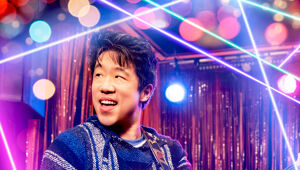
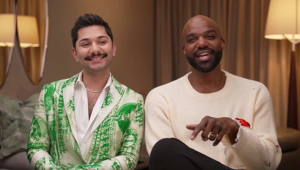
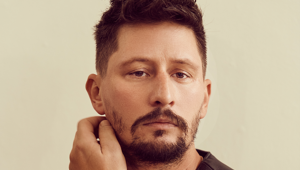
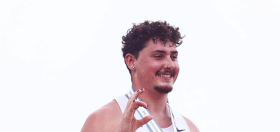


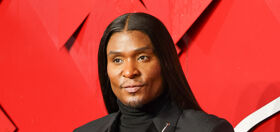
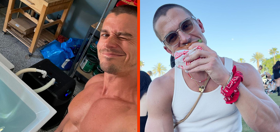
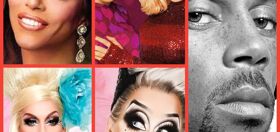

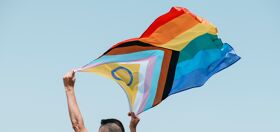
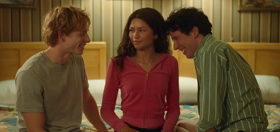

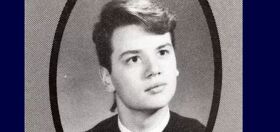

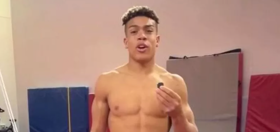


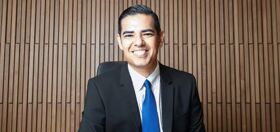

Cam
I’m hot for you, Michael. Are…are you immune to disease?
greekboy
I got dragged for not liking all in the family. Well, this twerp is sh#t and so is the sh%t he does. All right guys, take your shots
Liquid Silver
No real criticism. I can’t say I find his stuff funny, and after reading the interview, I’m not impressed with his “depth,” either. It just falls flat.
“For the most part, everybody gets what I’m doing and says good things about it. Except in the Queerty comments section.”
Sure, Miss Kitty. Sure. If one is careful not to poke one’s nose out of one’s entitled little community, I’m sure that’s the case.
Really, at the heart of it all, my takeaway is that I’m mildly disappointed Teddy Bear has given up time from his classy, wonderful porn to help make this crap.
BoomerMyles
He got really preachy there for a while.
His earlier sketches were really funny.
Invader7
@ the above commentators : Where the F**k are your videos ? It’s easy to criticize …a LOT harder to put out content… Just saying…
Liquid Silver
By that light, you can never criticize Trump; you were never President. You can never criticize Meghan McCain. You are not on television and not the daughter of an ex-Senator who died.
Suffice to say I’m entirely capable of deciding if I like something or I don’t. In this case I don’t. And watch the gatekeeping, we can play that game too. Where are your videos that make you capable enough to have any opinion whatsoever pertaining to OUR opinions?
Citation required. Warning–you will be judged. Harshly.
starri
Good for him for having confidence in himself.
He’s still not funny.
Invader7
@ Liquid Silver: wow.. Who appointed head a-hole? It’s just an opinion.. Get over yourself !!!